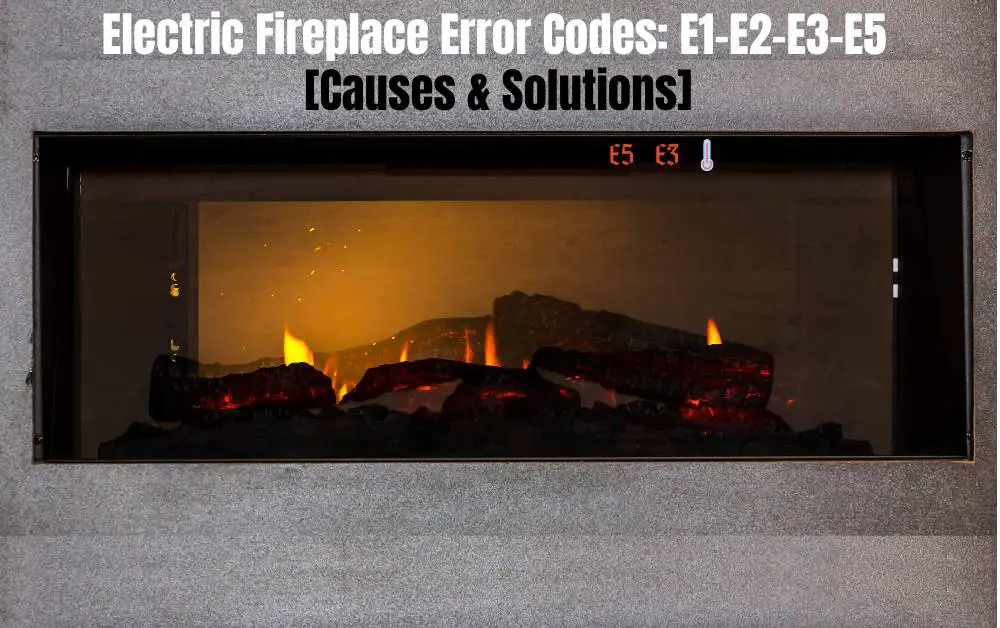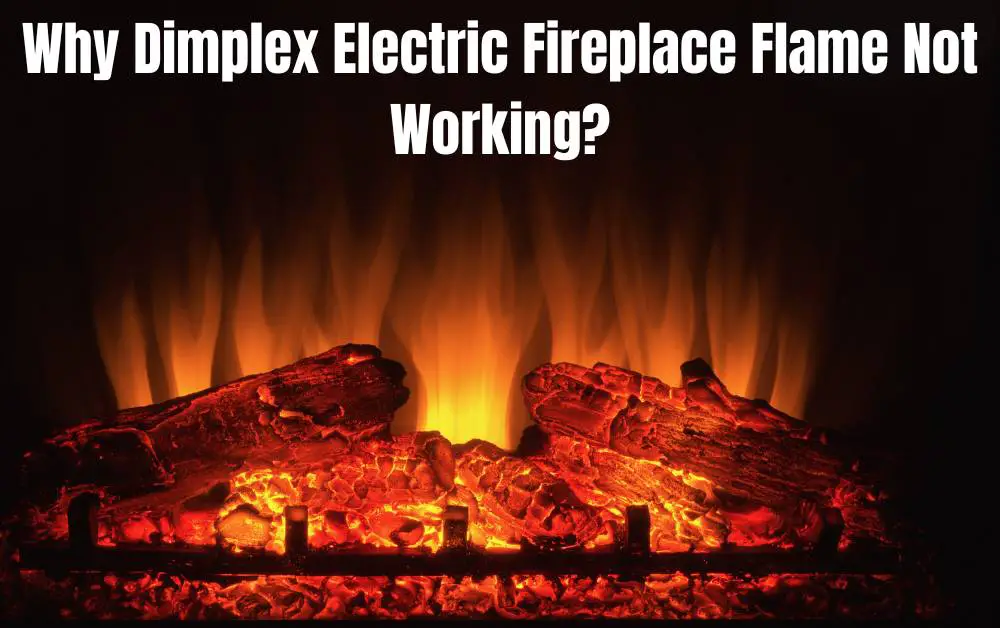Electric fireplaces are a popular alternative to traditional wood-burning fireplaces, offering the ambiance of a fire without the hassle of cleaning up ashes and storing firewood. However, sometimes the electric fireplace fan may not work properly, which is responsible for circulating the heated air. So, why electric fireplace fan not working?
The common causes for electric fireplace blower not working are:

- Dirty or clogged fan Blades
- Wiring issues
- Thermostat Problems
- Blown Fuse
- Low Quality fan motor
- Control module issues
- Main Switch Issues
This can be a frustrating problem, especially during the colder months when you’re counting on your fireplace to provide warmth and comfort.
In this blog post, we will discuss the common causes of electric fireplace fan failure and provide step-by-step instructions on troubleshooting and fixing the issue.
Why my Electric Fireplace Fan not working?
The leading cause of an electric fireplace blower not working is often a power supply issue. First, check the power supply to ensure the fireplace is properly plugged in and that the outlet is functioning; testing it with another device can confirm this. If the power supply is fine, the problem may lie with internal components such as the temperature sensor, which could be faulty and preventing the fan from turning on.
Inspect the thermostatic snap switch for good contact with the fireplace body, as a poor connection here can stop the fan from working.
Additionally, a defective rheostat, which controls the fan speed, might be the culprit. Mechanical issues, like blockages from dust or debris, can also hinder fan operation, so cleaning the fan and its surrounding area is advisable.
Common Reasons for Electric Fireplace Blower not Working
There are several common reasons for the fan not working on electric fireplace:
- Reason#1 Dirty or clogged fan Blades
- Over time, dust and debris can accumulate on the fan blades, reducing their efficiency and causing them to stop working.
- Reason#2 Blown Fuse
- A blown fuse can prevent the fan from operating. Your heater equipment fuse often blown by an electrical surge or a malfunction in the fireplace’s heating elements.
- Reason#3 Bad fan Motor
- The fan motor may wear out over time or stop working due to a lack of maintenance. This can cause the fan to stop turning altogether.
- Reason#4 Wiring issues
- Loose or frayed wires or power cable can prevent the fan from receiving the power it needs.
- Reason#5 Thermostat Problems
- If the fireplace’s thermostat is not working properly, it may prevent the fan from turning on even if the heating elements are functioning.
- Reason#6 Broken fan Switch
- The fan switch controls the fan’s operation; if it’s broken, the fan won’t work.
- Reason#7 Control module issues
- If the control module, which regulates the operation of the fan and heating elements, is faulty, it can prevent the fan from working.
How to fix the Electric fireplace Fan issue when it stops working?
- If your electric fireplace not blowing heat, remove any dust and debris that may have accumulated on the fan blades. This can usually be done by turning off the fireplace, unplugging it, and using a soft cloth or brush to clean the blades.
- Check the fuse and if it has blown, replace it with a new one of the same rating. You can find replacement fuses at hardware stores or online.
- Inspect the fan motor if blower not working on electric fireplace, and if it is worn out or not functioning properly, it will need to be replaced. You can purchase a replacement fan motor from the manufacturer or a third-party supplier.
- If you find any loose or frayed wires, use electrical tape to secure them. If the problem persists, you may need to replace the wiring.
- Check the thermostat and if it is not working properly, it may need to be replaced. This is a more involved process and may require the assistance of a professional.
- If the main switch is broken, you will need to replace it with a new one. This can usually be done by turning off the fireplace, unplugging it, and following the manufacturer’s instructions for replacing the switch.
- Replace the control module if it is faulty, it will need to be replaced. This is a more involved process and may require the assistance of a professional.

It’s important to follow all safety precautions when working on your electric fireplace, including turning off the power and unplugging the unit before performing any repairs.
If you’re unsure how to fix the issue or don’t feel uncomfortable repairing yourself, it’s always best to contact a professional.
How Long Does It Take for A Fireplace Blower to Turn on and off?
Usually, it takes 10-15 minutes for a fireplace blower to turn on. However, the time it takes for a blower to turn on and off can vary depending on several factors, such as the type of fireplace and the specific model of the blower.
Typically, a fireplace blower will turn on within a few minutes of the fireplace being turned on and will turn off shortly after the fireplace is turned off. The exact amount of time it takes will depend on the fireplace’s heat output, the room’s size, and the blower’s speed and efficiency.
Some fireplace blowers are equipped with thermostats or other controls that allow the user to adjust the speed and timing of the blower. This can also affect the time it takes for the blower to turn on and off.
Why is my Fireplace Blower Not Running?

There are several possible reasons a fireplace blower may not be running. Here are some of the most common causes:
- Power source issue
- Thermostat issue
- Fan switch issue
- Blower motor issue
- Blocked air flow
- Electrical problem
If you cannot diagnose and fix the problem, call a professional to inspect and repair your fireplace blower.
How To Tell If A Fireplace Blower Is Working Or Not?
Here are some ways to determine whether a fireplace blower is working or not:
- Listen for noise: If the blower is working, you should be able to hear it running.
- Feel for airflow: Place your hand near the vents or ducts to see if you can feel the air moving.
- Measure the voltage: You can use a multimeter to measure the voltage at the blower motor. If there is no voltage, the blower is not working.
Why Is Electric Fireplace Making A Clicking Noise?
An electric fireplace that is making a clicking noise can be caused by a few different issues:
- Relay switch
- Thermostat issue
- Loose or worn parts
- Heating element issue
- Power source issue
It’s important to address the clicking noise as soon as possible, as it may indicate a problem with the electric fireplace that could cause it to stop functioning altogether. If you cannot diagnose and fix the problem, call a professional to inspect and repair your electric fireplace.

FAQ
My fireplace flame is on, but no warm air is coming out. Why?
If you have a flame in your fireplace, but no warm air is coming out, there may be a problem with the fireplace blower or the air circulation system.
Can electric fireplaces cause fires?
Electric fireplaces have the advantage of being relatively safe compared to traditional wood-burning fireplaces. However, like any electrical appliance, electric fireplaces can still pose a fire risk if they are not used or maintained properly.
Can you replace the fan with an electric fire?
Yes, it is possible to replace the fan in an electric fireplace. If the fan in your electric fireplace has stopped working, is making strange noises, or is not providing adequate air circulation, replacing the fan may be necessary.
Does an electric fireplace need a fan?
Many electric fireplaces come equipped with a fan, which is used to circulate warm air throughout the room. The fan helps distribute the heat evenly and increases the fireplace’s overall efficiency.
Do electric fireplaces use a lot of electricity?
The amount of electricity an electric fireplace uses can vary depending on several factors, including the size of the unit, the heating setting, and the length of time it is used.
Is it safe to leave an electric fireplace on all day?
We never recommend leaving your electric fireplace all say. There are fire hazard risks and malfunctioning of your heater associated. Keep your electric fireplace turned on for 3-4 hours and turn it off before you go to bed.
Is an electric fireplace safer than gas?
Electric fireplaces are considered a safer option than gas fireplaces, as they do not produce harmful fumes or pose the risk of gas leaks. Electric and gas fireplaces have their own set of safety considerations and potential hazards.
Affiliate Disclosure: Fireplaceadviser.com is a participant in the Amazon Services LLC Associates Program. We may earn a commission when you click on certain links on this site and purchase.

Hello!! I am Jamal Khan. I often fix my home electric heaters and gas stove problems and research the common issues in the heating units to improve my knowledge and expertise. The aim of establishing fireplaceadviser.com is to share my expertise and knowledge with my audience.

















